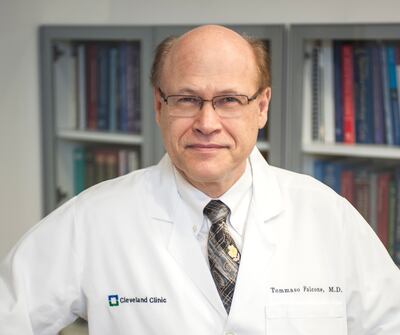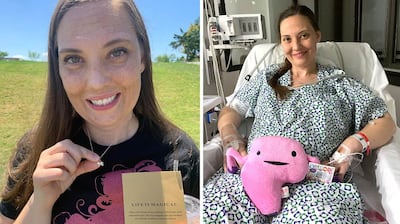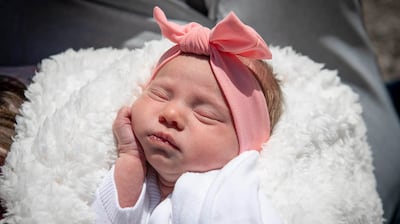Thousands of women could be having womb transplants in the near future, a surgeon who helped to pioneer the procedure predicts.
In the wake of the first womb transplant in the UK, Tommaso Falcone told The National they could become as common as kidney swaps.
Dr Falcone was part of the Cleveland Clinic team that performed America’s first womb transplant and also led clinical trials on the procedure. He is now chief of staff at the Cleveland Clinic's London hospital.
As the surgery is perfected, womb transplants will become an alternative to surrogacy, which remains banned in many countries, he believes.
“I foresee that it will be in thousands of women,” he said, and added that he believed it would take only “five years to reach that level”.
“As soon as we have it down to a form where we can minimise the risks in the donor and minimise the risk in the recipient, then it will increase.
“That will require experience in developing different techniques that we can use. I’m confident that we will evolve.”
Research is currently focused on developing anti-rejection drugs based on other transplant surgeries, he explained.

“It could be as common as a kidney transplant and that would be the best comparison, not heart or lungs,” Dr Falcone said.
“The kidney is very common and there’s a similar concept in the way we attach blood vessels because it’s in a similar area.”
Transplanting a womb is an intricate procedure in which one surgical team removes the organ from the donor and a second transplants it into the recipient.
Both stages of the procedure are serious operations lasting many hours, and the patients remain in hospital for days afterwards.
Wombs from either living or deceased donors are possible, and a woman who a transplant from a deceased donor at the Cleveland Clinic was the first to give birth with a donated uterus in the US.
Dr Falcone said “we’ve come a long way” since the first womb transplant, which took place in Sweden in 2013.
Work is under way to improve the way the organ is removed from the donor, and “we’re trying to do that more and more robotically, to decrease the risk”. The aim is to cut the 10-hour operation time in half.

Dr Falcone is the son of Italian immigrants and obtained his medical degree from McGill University School of Medicine in Montreal in 1981.
“It gives me satisfaction because it shows this type of procedure is evolving in the world,” he said.
“It also gives me satisfaction because there has been extreme criticism by a lot of people.
“A lot of people would write articles saying, ‘Falcone’s crazy’, because they would look at it and say, 'Why doesn’t someone go through surrogacy instead of having this procedure?'
“But all of a sudden, having a baby becomes a possibility, so I think it’s an amazing advancement.”
So far, there have been about 90 babies born around the world to women who have received womb transplants.
One of them is Amanda Gruendell, who gave birth to her daughter Grace in 2021 at the Cleveland Clinic. She had been diagnosed with Mayer-Rokitansky-Kuster-Hauser Syndrome, a congenital disorder that affects the reproductive system, when she was 17.
“I had always wanted to be a mum and as early as five years old had baby dolls and wanted to play house as many little girls do,” the 39-year-old from Utah told The National.
“When I was diagnosed, to have that ripped away from me was devastating.”

Ms Gruendell heard the Cleveland Clinic was embarking on trials through an MRKH support group. Being single at the time, she was unsure if she would be accepted. After she began the programme, she married a childhood friend.
“I knew that the transplant might not work and it might not end with a baby in my arms but I wanted to be a part of it,” she said.
“How do you not take that chance of a lifetime? And I wanted women and girls to have other options and really wanted to be a part of something bigger.”
Ms Gruendell soon found out she was pregnant.
“I never felt joy like it,” she said.
“I really never thought this would happen in my lifetime. I didn’t ever think that it would be possible but was always hoping that it could be.
“It was so amazing to have her in my arms. Now when I snuggle her or hug her, I think I this was all worth it. She’s everything I waited for my entire life.”
She is now trying for a second baby and said she hopes transplants can be extended to women whose wombs have been affected by other conditions, such as cancer.
“Every person who gets their transplant, I’m so excited for them,” she said.

